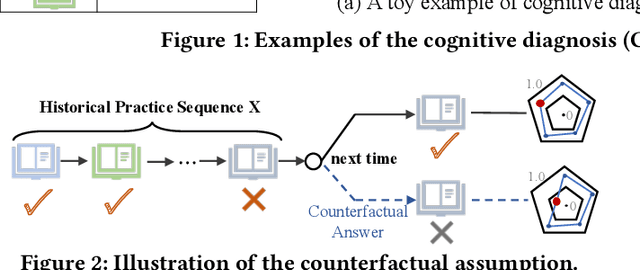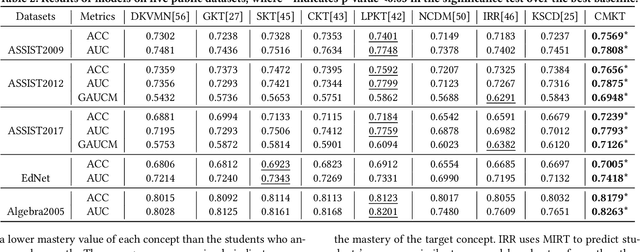Wenchen Qian
Cognition-Mode Aware Variational Representation Learning Framework for Knowledge Tracing
Sep 03, 2023Abstract:The Knowledge Tracing (KT) task plays a crucial role in personalized learning, and its purpose is to predict student responses based on their historical practice behavior sequence. However, the KT task suffers from data sparsity, which makes it challenging to learn robust representations for students with few practice records and increases the risk of model overfitting. Therefore, in this paper, we propose a Cognition-Mode Aware Variational Representation Learning Framework (CMVF) that can be directly applied to existing KT methods. Our framework uses a probabilistic model to generate a distribution for each student, accounting for uncertainty in those with limited practice records, and estimate the student's distribution via variational inference (VI). In addition, we also introduce a cognition-mode aware multinomial distribution as prior knowledge that constrains the posterior student distributions learning, so as to ensure that students with similar cognition modes have similar distributions, avoiding overwhelming personalization for students with few practice records. At last, extensive experimental results confirm that CMVF can effectively aid existing KT methods in learning more robust student representations. Our code is available at https://github.com/zmy-9/CMVF.
* Accepted by ICDM 2023, 10 pages, 5 figures, 4 tables
Counterfactual Monotonic Knowledge Tracing for Assessing Students' Dynamic Mastery of Knowledge Concepts
Aug 07, 2023



Abstract:As the core of the Knowledge Tracking (KT) task, assessing students' dynamic mastery of knowledge concepts is crucial for both offline teaching and online educational applications. Since students' mastery of knowledge concepts is often unlabeled, existing KT methods rely on the implicit paradigm of historical practice to mastery of knowledge concepts to students' responses to practices to address the challenge of unlabeled concept mastery. However, purely predicting student responses without imposing specific constraints on hidden concept mastery values does not guarantee the accuracy of these intermediate values as concept mastery values. To address this issue, we propose a principled approach called Counterfactual Monotonic Knowledge Tracing (CMKT), which builds on the implicit paradigm described above by using a counterfactual assumption to constrain the evolution of students' mastery of knowledge concepts.
No Length Left Behind: Enhancing Knowledge Tracing for Modeling Sequences of Excessive or Insufficient Lengths
Aug 07, 2023Abstract:Knowledge tracing (KT) aims to predict students' responses to practices based on their historical question-answering behaviors. However, most current KT methods focus on improving overall AUC, leaving ample room for optimization in modeling sequences of excessive or insufficient lengths. As sequences get longer, computational costs will increase exponentially. Therefore, KT methods usually truncate sequences to an acceptable length, which makes it difficult for models on online service systems to capture complete historical practice behaviors of students with too long sequences. Conversely, modeling students with short practice sequences using most KT methods may result in overfitting due to limited observation samples. To address the above limitations, we propose a model called Sequence-Flexible Knowledge Tracing (SFKT).
 Add to Chrome
Add to Chrome Add to Firefox
Add to Firefox Add to Edge
Add to Edge